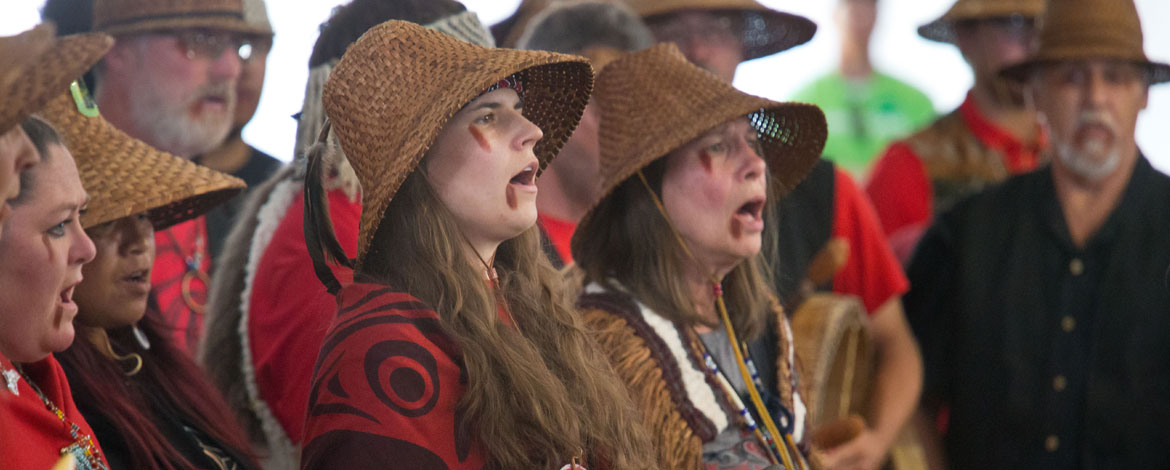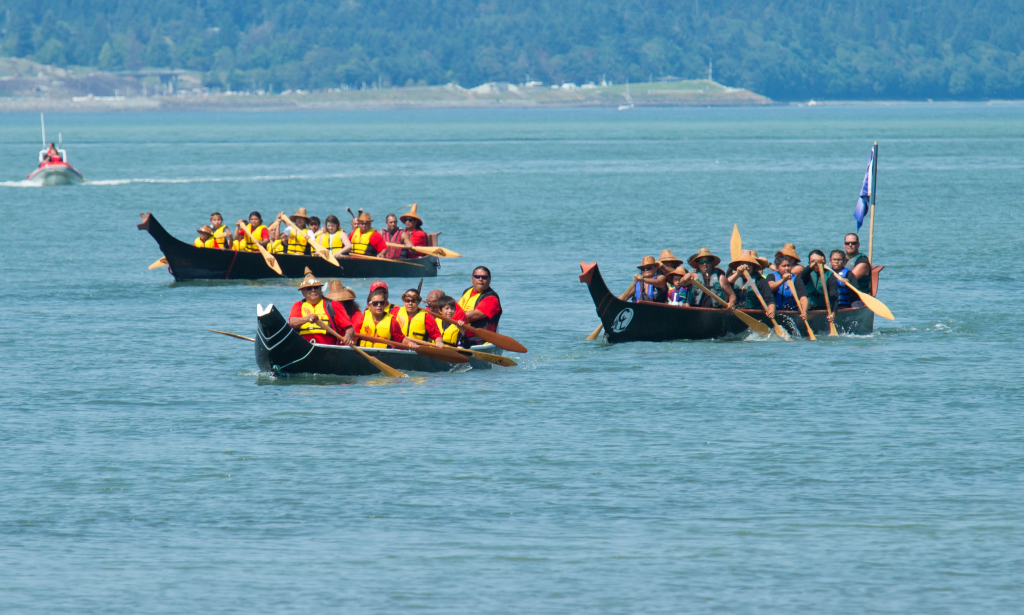Lute journeys with fellow Samish tribal members in canoe Power Paddle to Puyallup

Image: Kelly Hall ’16, a language specialist with her tribe, sings alongside fellow Samish tribal members during protocol, a ceremonial sharing of stories, songs and dances at the Power Paddle to Puyallup. The ceremony was part of the annual canoe journey. (Photo by John Froschauer/PLU)
By Kari Plog '11
PLU Marketing & Communications
Before Kelly Hall ’16 and the rest of her Samish canoe family paddled their final strokes through the Hylebos Waterway, Hall did something no one in her tribe had done for many years.
“I’m the first tribal member in decades to speak the language while coming to shore,” she said during a break from annual canoe journey festivities.
Hall, a language specialist for the Samish tribe, says she’s witnessed an increasing number of people speaking their native language — both during last week’s Power Paddle to Puyallup and in everyday life.
“It’s really powerful,” she said.
Hall grew up on traditional Samish lands, ancestral areas around Anacortes, Washington, and the San Juan Islands. She first connected with her tribe in 2003, but for a long time didn’t embrace all that came with her Native American identity.
It wasn’t until a decade later, through her studies at Pacific Lutheran University, that Hall reconnected with the Samish on a deeper level. A class on myths, rituals and symbols with her mentor — Suzanne Crawford O’Brien, professor of religion and culture — got Hall thinking about her own culture more than ever before.

Soon, Crawford had Hall working with the group that established the Native American and Indigenous Studies program at PLU, a venture that led to networking with local indigenous leaders. Hall even worked with her current Samish supervisor for her language studies, part of the curriculum in her individualized interdisciplinary major in Native American and indigenous studies.
“I’m the first Samish member to get college credit for studying my own language,” Hall said.
Her academic journey culminated in a passion for cultural revitalization. The seed that was planted with Hall’s initial research in college has become a major part of her daily life.
And it was on display last week on the Salish Sea and in the canoe journey camp at Chief Leschi School in Puyallup.
This year’s host for the journey, which allows participating tribes to share and revitalize their native cultures, was the Puyallup Tribe of Indians. It’s the first time in 20 years the Puyallups have hosted the event, one that’s grown from few canoes to more than 100 this year, Hall said.
“It’s medicine for people. Our tribal communities have experienced lots of trauma,” she said. “This event brings a lot of healing.”
In potlatch tradition, canoe journey hosts provide lodging, food and other accommodations for tribes that travel from as far north as Alaska. They also provide massive tent structures for protocol, the ceremonial sharing of songs, dances and stories with the participating communities.
“It’s a huge honor and investment to host something like this,” Hall said.
For Hall, the cultural exchange is especially meaningful for the Samish, since the tribe’s people are typically very scattered. When they come together in large numbers to honor their shared culture, Hall says she feels at home.
“When we’re out there singing our songs on the water, there’s a feeling of interconnectedness between everything,” Hall said. “When we sing songs and speak our language on the water, it brings life into (our canoe and paddles) and carries us safely to our next stop.”
Canoe journey is one of many ways Hall helps with the cultural resurgence for the Samish and other indigenous groups.
This spring, she represented her tribe as part of a delegation that traveled to Russia. The cultural exchange with the Nenets people included staying in the traditional homes of reindeer herders in the tundra and discussing concerns of climate change, among other important issues. Last week, local tribes returned the favor by welcoming a group of Nenets people during part of canoe journey festivities, Hall added.
“Even though we live in vastly different climates and regions,” Hall said, “there are many more similarities than differences.”
Hall is committed to continuing cultural exchanges with other indigenous groups. Before beginning her work with the Samish, she worked with an indigenous population in Rwanda.
“There’s power in bringing our voices together and learning about one another,” she said.
That’s why canoe journey, in particular, is so important.
“It’s incredible to see how big this event has grown,” Hall said. “Every year, there are more and more canoes that participate.”



Social Media